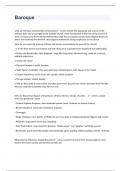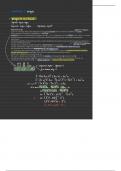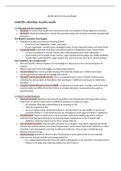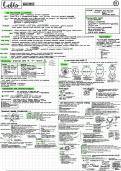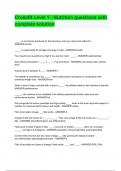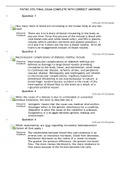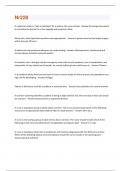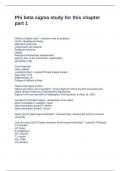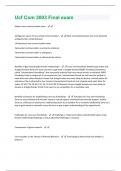Thought Experiments deepening seminars
Seminar 1
Aesthetics is missing
Metaphilosophy: what is philosophy, what is philosophy good for and what is good philosophy
Other kinds of inferences
● Deductive logic: number of premises, and the conclusion comes from the premises → it
cannot be true that the premises are true and that the conclusion is false
○ Nothing new ever comes to light → conclusion always have been contained in
premises
● Most logic add stuff to reasoning: risk to making mistakes → enumerative and analogical
induction
○ Enumerative: Tim has given 7 presentations on his laptop, so he will give a laptop
presention in the 8th lecture as well
○ Analogical induction: some metal has properties A, B, C and D → you find
something that has properties ABC, you induce that it will probably have D as well
● Abduction = explanatory inference
○ President of the student organization enters the room with a baguette and onions →
what do you think that the study group will go to, abduce that it will be France
● Counterfactual TEX (if only..): what if I were a rich man, what would I do
● Abductive TEX = reasoning from what you observe to reverse semi factual TEX
○ Imagine alternative worlds that constitute as alternatives to our world
Arguments for & against the existence of God
Teleological argument (abductive thought experiment → world is so perfect must be designed)
● a.k.a argument from design: there must be a designer for what we see
● e.g: Paley’s watch: very pretty watch, has to be some designer of it
● Intelligent design & creationism vs. Darwinian evolution
● Objection: design flaws → if God has designed the world, he must be very ‘clumsy’ → world
is imperfect
Cosmological argument (abductive thought experiment)
● Events must be explained in terms of prior events
● No infinite regress argument: there must be a very special first cause
● Chain of causes cannot infinitely stretch backward in time
● God as the first cause, the ‘uncaused cause’
● “turtles all the way down” → infinite chain of turtles on one another
Moral argument
● I experience a sense of duty; there are certain things we must/mustn't do → in each situation,
there is the right thing we should do → God has formed this
● Postulates God and free will
● Loobuyk: fictionalism → God exists as a fictional object, and that is enough for morality
● Why should I be moral? Social contract
Argument from evil
, ● God all-good, all-wise, all-powerful
● Is impassible with evil in the world
● Leibniz’s theodicee: the best of all possible worlds → God is all-knowing, he has the
overview of all possible worlds, and God is all good because he chooses to create the best one
● vs. Voltaire’s Candide
Possible worlds
● Alethic modalities: possibility and necessity]
● Intuitively, it’s the case in an or in all possible worlds
○ possibility that I have a hair less is possible in another world
● Counterfactual: closest possible world in which the antecedent of your counterfactual is
realised
● David Lewis: pluriverse is philosopher’s paradise
○ Pluriverse of all possible worlds exist; just like our world, the actual world, exists
Ontological argument
● Anselm, but also Descartes: a priori, ex nihili proof of existence of God
● I can conceive of God as the greatest possible being
● Must exist in reality, otherwise it wouldn’t be the greatest being
○ If it would not exist, it is not perfect but it is
● Kant’s objection: existence is not a property, it assumes that it has a property
○ Existence is a preconditon of having properties
Platinga
1) God is (conceivable and thereby) possible
2) If God is possible, God exists in a PW
3) If God exists in a PW, God exists in all PW
4) If God exists in all PW, God exists in the actual world
5) If God exists in the actual world, God exists
Prudential argument
● If you believe in God and he doesn’t exist: you hardly lose
○ If you believe and he exists: you will live
● If you disbelieve in God and he exists: you lose everything
● If you compare the pros and cons → you can better believe in God
● Galen Strawson objects: if God exists, he loves atheists best, because they are the smartest
creatures, he loves those that outperform the more stupid ones
Seminar 2
Truth-tracking analysis: has two conditions; safety condition & sensitivity condition
No-defeaters is not a necessary condition for knowledge
Question about Ford/Barcelona
, Other example: suppose you believe that Rotterdam is a beautiful city. Defer from that: you either
know that Rotterdam is a beautiful city OR elephants wear pink underwear → also true, because
Rotterdam is a beautiful city (basically infer that Rotterdam is a beautiful city or whatever). Sentence
is not made true by Rotterdam being a beautiful city, but because elephants wear pink underwear
one thing that you believe this, does not mean is true
Gettier first case
Smith is chilling and believes that Jones is the man who will get the job
Jones is the man who will get the job
Jones has 10 coins
deductive inference: Therefore, the man who will get the job, has 10 coins
What happens: Smith gets the job, and also has 10 coins in his pocket!
Epistemic luck, because he
How does the analysis deal with the Job Seekers case?
No false grounds: ‘grounds’ means reasons for belief, no false premises/propositions in the
reasoning. There may not be a single false premise in the reasoning leading up to the job. Condition
not met
Solves the Gettier case by: it solves the Gettier case because in this case, there is a false grounds, Mr.
Jones was believed to be the man who got the job, but he didn’t get it → no knowledge has been
gained.
No defeaters analysis: to test for no defeaters you should think through the counterfactual; when he
has this information, he would no longer belief (suppose he has this information, what would he then
belief) → he would not justifiably belief that the man who will get the job has 10 coins
Causal analysis: the truth-maker of the sentence is he himself, he causes the truth of the sentence of
the ‘the man who will get the job, has 10 coins’ → hickup between Jones and Smith
Truth-tracking analysis: p → man who will get the job gets 10 points
now go to the closest possible world in which p is not true
In the world where someone has 11 coins in his pocket, we’ll still believe that the man who has 10
coins in his pocket (not sensitive to the truth of p) → therefore he doesn’t know, change the job or
change the amount of points
Oedipus Rex
● Laius = biological father Oedipus, he believes it’s Polybus
● Polybus death: My father has died (and I didn’t kill him)
● My father has died (but I killed him)
How does the analysis deal with Oedipus Rex?
Truth-tracking analysis (counterfactual): go to the closest possible world, in which his father (being
Laius) has not died → then it is not true. In that closest possible world he would still believe that his
father is Polybus, therefore his belief does not need the sensitivity condition. If his father had not died,
he would still believe that his father has died because Polybus died
Seminar 1
Aesthetics is missing
Metaphilosophy: what is philosophy, what is philosophy good for and what is good philosophy
Other kinds of inferences
● Deductive logic: number of premises, and the conclusion comes from the premises → it
cannot be true that the premises are true and that the conclusion is false
○ Nothing new ever comes to light → conclusion always have been contained in
premises
● Most logic add stuff to reasoning: risk to making mistakes → enumerative and analogical
induction
○ Enumerative: Tim has given 7 presentations on his laptop, so he will give a laptop
presention in the 8th lecture as well
○ Analogical induction: some metal has properties A, B, C and D → you find
something that has properties ABC, you induce that it will probably have D as well
● Abduction = explanatory inference
○ President of the student organization enters the room with a baguette and onions →
what do you think that the study group will go to, abduce that it will be France
● Counterfactual TEX (if only..): what if I were a rich man, what would I do
● Abductive TEX = reasoning from what you observe to reverse semi factual TEX
○ Imagine alternative worlds that constitute as alternatives to our world
Arguments for & against the existence of God
Teleological argument (abductive thought experiment → world is so perfect must be designed)
● a.k.a argument from design: there must be a designer for what we see
● e.g: Paley’s watch: very pretty watch, has to be some designer of it
● Intelligent design & creationism vs. Darwinian evolution
● Objection: design flaws → if God has designed the world, he must be very ‘clumsy’ → world
is imperfect
Cosmological argument (abductive thought experiment)
● Events must be explained in terms of prior events
● No infinite regress argument: there must be a very special first cause
● Chain of causes cannot infinitely stretch backward in time
● God as the first cause, the ‘uncaused cause’
● “turtles all the way down” → infinite chain of turtles on one another
Moral argument
● I experience a sense of duty; there are certain things we must/mustn't do → in each situation,
there is the right thing we should do → God has formed this
● Postulates God and free will
● Loobuyk: fictionalism → God exists as a fictional object, and that is enough for morality
● Why should I be moral? Social contract
Argument from evil
, ● God all-good, all-wise, all-powerful
● Is impassible with evil in the world
● Leibniz’s theodicee: the best of all possible worlds → God is all-knowing, he has the
overview of all possible worlds, and God is all good because he chooses to create the best one
● vs. Voltaire’s Candide
Possible worlds
● Alethic modalities: possibility and necessity]
● Intuitively, it’s the case in an or in all possible worlds
○ possibility that I have a hair less is possible in another world
● Counterfactual: closest possible world in which the antecedent of your counterfactual is
realised
● David Lewis: pluriverse is philosopher’s paradise
○ Pluriverse of all possible worlds exist; just like our world, the actual world, exists
Ontological argument
● Anselm, but also Descartes: a priori, ex nihili proof of existence of God
● I can conceive of God as the greatest possible being
● Must exist in reality, otherwise it wouldn’t be the greatest being
○ If it would not exist, it is not perfect but it is
● Kant’s objection: existence is not a property, it assumes that it has a property
○ Existence is a preconditon of having properties
Platinga
1) God is (conceivable and thereby) possible
2) If God is possible, God exists in a PW
3) If God exists in a PW, God exists in all PW
4) If God exists in all PW, God exists in the actual world
5) If God exists in the actual world, God exists
Prudential argument
● If you believe in God and he doesn’t exist: you hardly lose
○ If you believe and he exists: you will live
● If you disbelieve in God and he exists: you lose everything
● If you compare the pros and cons → you can better believe in God
● Galen Strawson objects: if God exists, he loves atheists best, because they are the smartest
creatures, he loves those that outperform the more stupid ones
Seminar 2
Truth-tracking analysis: has two conditions; safety condition & sensitivity condition
No-defeaters is not a necessary condition for knowledge
Question about Ford/Barcelona
, Other example: suppose you believe that Rotterdam is a beautiful city. Defer from that: you either
know that Rotterdam is a beautiful city OR elephants wear pink underwear → also true, because
Rotterdam is a beautiful city (basically infer that Rotterdam is a beautiful city or whatever). Sentence
is not made true by Rotterdam being a beautiful city, but because elephants wear pink underwear
one thing that you believe this, does not mean is true
Gettier first case
Smith is chilling and believes that Jones is the man who will get the job
Jones is the man who will get the job
Jones has 10 coins
deductive inference: Therefore, the man who will get the job, has 10 coins
What happens: Smith gets the job, and also has 10 coins in his pocket!
Epistemic luck, because he
How does the analysis deal with the Job Seekers case?
No false grounds: ‘grounds’ means reasons for belief, no false premises/propositions in the
reasoning. There may not be a single false premise in the reasoning leading up to the job. Condition
not met
Solves the Gettier case by: it solves the Gettier case because in this case, there is a false grounds, Mr.
Jones was believed to be the man who got the job, but he didn’t get it → no knowledge has been
gained.
No defeaters analysis: to test for no defeaters you should think through the counterfactual; when he
has this information, he would no longer belief (suppose he has this information, what would he then
belief) → he would not justifiably belief that the man who will get the job has 10 coins
Causal analysis: the truth-maker of the sentence is he himself, he causes the truth of the sentence of
the ‘the man who will get the job, has 10 coins’ → hickup between Jones and Smith
Truth-tracking analysis: p → man who will get the job gets 10 points
now go to the closest possible world in which p is not true
In the world where someone has 11 coins in his pocket, we’ll still believe that the man who has 10
coins in his pocket (not sensitive to the truth of p) → therefore he doesn’t know, change the job or
change the amount of points
Oedipus Rex
● Laius = biological father Oedipus, he believes it’s Polybus
● Polybus death: My father has died (and I didn’t kill him)
● My father has died (but I killed him)
How does the analysis deal with Oedipus Rex?
Truth-tracking analysis (counterfactual): go to the closest possible world, in which his father (being
Laius) has not died → then it is not true. In that closest possible world he would still believe that his
father is Polybus, therefore his belief does not need the sensitivity condition. If his father had not died,
he would still believe that his father has died because Polybus died

